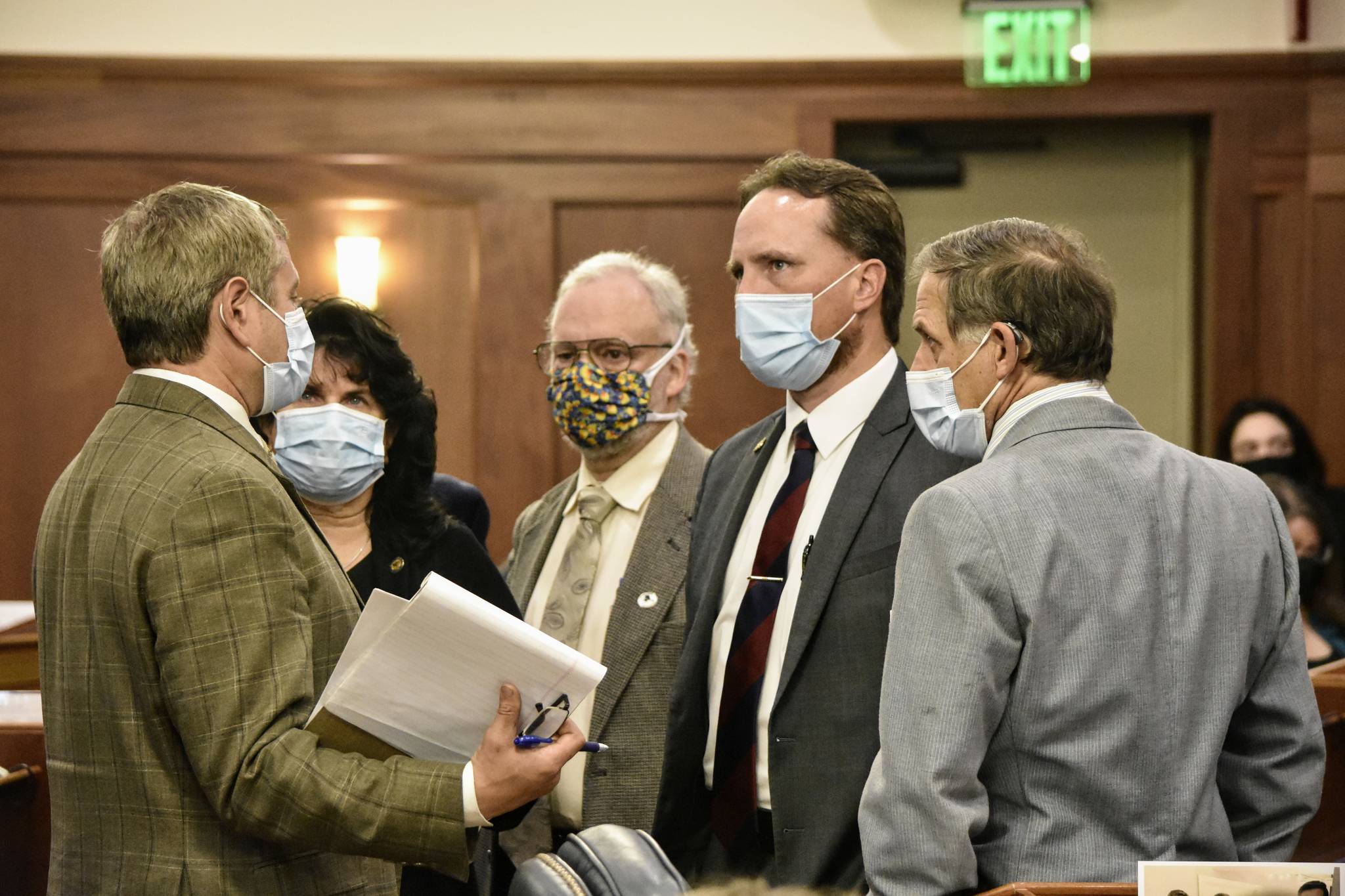The Alaska House of Representatives worked into the evening Monday, amending an appropriations bill introduced by Gov. Mike Dunleavy and modified by the House Finance Committee.
Members of the House minority caucus object strongly to the committee’s version, saying they hadn’t been given enough time to properly vet the bill nor were they given sufficient time to scrutinize proposed amendments to the bill.
All 40 members of the House were present for floor sessions Monday, where members of the House majority tried to advance a version of House Bill 3003 to complete the state’s budget. Minority members have complained not enough attention has been paid to resolving the state’s long-term fiscal deficit as House leadership has made the budget a priority.
Committee meetings have been scheduled for every day this week to hear proposals on deficit issues but lawmakers have yet to allocate a Permanent Fund Dividend and some state programs and obligations remain unfunded. The House voted to adopt the committee’s version of the bill which allocated a $1,100 PFD and added back funding vetoed by the Dunleavy administration.
But before House members could vote on the bill and send it to the Senate, lawmakers found themselves debating familiar topics.
[Divisions delay work as lawmakers trade blame]
“I feel like I’ve done this before,” said Rep. DeLena Johnson, R-Palmer, of an amendment to pay PFDs based on a 1982 formula.
An amendment from Rep. David Eastman, R-Wasilla, to use $2.5 billion to pay dividends based on that formula, which he and other minority members said the state must either follow or change.
“We have statutes on the books. If the majority wants to change the payout, change the law. It worked for 35 years,” Johnson said during floor debate. “If we don’t like the law, change the law. It’s the law and as long as it’s the law I will be a yes vote.”
Members of the mostly Democratic majority pointed out the Alaska Supreme Court had ruled the state was not bound by that statute and that there are other obligations to pay — many of which are outlined in the state constitution and pre-date the PFD.
Rep. Ivy Sponholz, D-Anchorage, said to pay such a large dividend would require lawmakers to break the 5% of market value law passed in 2018 and Rep. Zack Fields, D-Anchorage, read from the state constitution regarding the creation of the Permanent Fund.
The makers of the fund, according to Fields “explicitly did this with the intention of funding services, many of them are in the constitution, school bond debt reimbursement and the universities.”
But minority members maintained the Legislature was taking money from Alaskans and spending it on government.
“Is it the people’s money or is it the government’s money,” asked Rep. Chris Kurka, R-Wasilla. “Does the Permanent Fund belong to the people or is it a sovereign wealth fund to fund government spending?”
In September 2019, the International Forum of Sovereign Wealth Funds held its annual conference in Juneau because of the Alaska Permanent Fund.
The amendment for a statutory PFD failed, as did a separate amendment from Eastman to pay a supplemental dividend based on interest earned on the difference between the statutory formula and the PFD amounts paid beginning in 2017.
Eastman also forwarded several amendments expressing legislative intent to have state money not go to entities with certain policies regarding COVID-19 vaccines. Amendments to block funding to entities that required vaccines in adults or minors failed, but an amendment intending to block funding to entities which “solicit, collect or maintain,” COVID-19 vaccine status information passed.
That vote passed narrowly, with Rep. Chris Tuck, D-Anchorage, crossing party lines to vote with the minority.
Eastman and several minority members said they had heard significant concern from constituents about the perceived erosion of civil liberties, even as members of the majority pointed out that vaccine requirements have been upheld by the U.S. Supreme Court for decades.
Another of Eastman’s amendments would have liquidated the Power Cost Equalization fund and transferred the money to the Constitutional Budget Reserve. That amendment failed 38-2 with only Eastman and Kurka voting to approve.
“We all want a strong PCE program,” said Rep. Mike Cronk, R-Tok, speaking against the amendment. “It not only pays for the subsidy but it pays for the infrastructure we all want.”
Once passed the bill will go to the Senate before coming back to the House of Representatives. The current special session ends Sept. 15.
House members were still debating amendments as of 5:30 p.m.
• Contact reporter Peter Segall at psegall@juneauempire.com. Follow him on Twitter at @SegallJnuEmpire.

